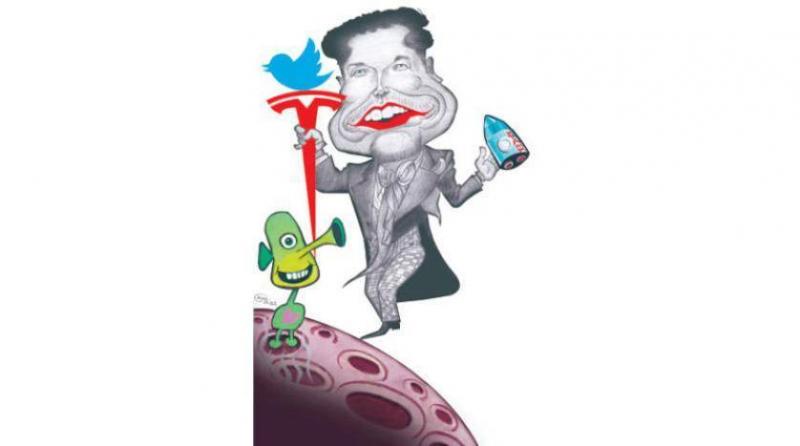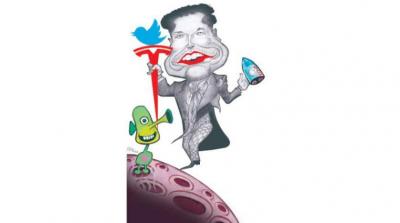Elon Musk probably didn't need to buy Twitter to capture the attention of the press, public opinion, and the entire world regarding his eccentric billionaire persona. He is an active user of this platform, which is politically prominent and undeniably the "elite" platform to which Musk himself belongs, boasting over 90 million followers. In June 2010, Musk tweeted for the first time on his personal account, sharing insights to promote his businesses and occasionally commenting on contemporary political and cultural issues. However, his decision to purchase the platform raised several questions about why this successful businessman and industrialist returned to the online space that initially propelled him into the billionaire rankings, now positioning him among the richest men on the planet, with a net worth estimated at around $300 billion—vastly outpacing the wealth of those directly behind him.
Elon Reeve Musk's beginnings do not indicate a "modest" social and financial upbringing. He was born on June 28, 1971, to a Canadian mother and a South African father, growing up in Pretoria, the capital of South Africa. His mother, Maye Haldeman, a model and dietitian, was born in Saskatchewan, Canada, but was raised in South Africa. His father, Errol Musk, was a electromechanical engineer, pilot, sailor, consultant, and real estate developer, once owning half of an emerald mine in Zambia near Lake Tanganyika. He has a younger brother named Kimbal and a younger sister named Tosca.
As a child, Musk underwent surgery to remove polyps because doctors suspected he was deaf. However, his mother later remarked that he lived "in another world." During his youth, his family was so wealthy that his father once said, "We had so much money that sometimes we couldn't even close our closet." His father was elected to the Pretoria City Council as a representative of the anti-apartheid Progressive Party, and it was said that his children shared his disdain for apartheid. After two years of his parents' divorce in 1980, Musk chose to live with his father in Pretoria and other places—a choice he later regretted, distancing himself from his father and describing him as "a terrible person... he did almost everything evil one could think of." He has a half-sister and half-brother from his father's side.
In his youth, Musk attended an evangelical Sunday school. By the age of about ten, he had developed an interest in computing and video games, teaching himself computer programming using a manual. At the age of twelve, he sold the source code for a video game he created called "Blastar" to a computer magazine for nearly $500. Family and friends have reported that he was a shy and introverted child who was bullied throughout his childhood and was hospitalized after being pushed down a flight of stairs. He later attended Waterkloof House Preparatory School and Bryanston High School before graduating from Pretoria Boys High School.
Realizing it would be easier to enter the U.S. from Canada, Musk applied for a Canadian passport through his mother. While waiting for the passport, he attended the University of Pretoria for five months, allowing him to avoid mandatory military service in South Africa. After arriving in Canada in June 1989, he lived with a second cousin in Saskatchewan for a year, working odd jobs on a farm and in a lumber mill.
In 1990, Musk enrolled at Queen's University in Kingston, Ontario. Two years later, he transferred to the University of Pennsylvania in the United States, graduating in 1997 with a Bachelor's degree in Physics and a Bachelor's degree in Economics from its prestigious Wharton School. In 1994, Musk completed two summer internships in Silicon Valley, California: one at the energy storage startup Pinnacle Research Institute, which studied supercapacitors, and one at rocket development startup Rocket Science Games in Palo Alto. In 1995, he was accepted into the Ph.D. program in Materials Science at Stanford University, but after receiving no response from Netscape regarding a job application, he left Stanford two days later to join the booming Internet "bubble" of the time and start his own company.
In 1995, Musk, along with his brother Kimbal and Greg Kouri, founded a software company called Zip2, financed by investors. They started the project in a small rented office in Palo Alto, developing and marketing an online city guide for the newspaper industry, complete with maps, directions, and yellow pages. Musk has mentioned that before the company became successful, he couldn't afford an apartment and instead rented an office where he slept on the sofa, showering at a YMCA and sharing a computer with his brother. He also recounts that when he and Kimbal couldn't agree on business decisions, they settled their disputes through wrestling. According to him, "The site was operating during the day, and I was coding it at night, seven days a week, all the time."
The Musk brothers secured contracts with The New York Times and the Chicago Tribune, convincing the board to abandon merger plans with another company. Later, the board thwarted Musk's attempts to become CEO, leading to Zip2's acquisition by Compaq for $307 million in cash in February 1999, netting Musk $22 million for his 7% stake.
Some view that company and the money Musk earned from its sale as the launchpad that propelled him and his brother Kimbal forward. That same year, he co-founded X.com, an online bank that merged with Confinity in 2000 to form PayPal, which eBay bought for $1.5 billion in 2002. In 2001, Musk joined the non-profit Mars Society and planned to establish greenhouse incubators for plant growth on Mars, intending to fund the project himself.
In October 2001, Musk traveled to Moscow with partners Jim Cantrell and Mike Griffin to purchase refurbished ballistic missiles capable of sending the greenhouse modules into space, meeting with Lavochkin and Kosmotras. However, Musk was viewed as a novice and was met with disdain from one of the senior Russian designers, prompting the group to return to the U.S. empty-handed.
In February 2002, the group returned to Russia seeking three ballistic missiles. Kosmotras offered one missile for $8 million, but Musk rejected the deal and decided instead to start a company to build rockets and provide affordable space transportation. That year, he founded SpaceX with an initial investment of $100 million from his early fortune, and by the end of 2021, the company was valued at approximately $100 billion, with Musk serving as its CEO and lead engineer to this day.
The major project Musk began planning, which sheds light on the reasoning behind his recent decision to buy Twitter, was the construction and development of the Starlink satellite constellation, designed for low Earth orbit. In 2015, SpaceX began deploying those satellites to provide internet service worldwide from space without the need for cables and ground stations. The total cost of the decade-long project is estimated to be around $10 billion. The project faced criticism from astronomers who claimed the satellites "obscure the night sky" and could lead to collisions. However, Musk dismissed those claims, stating that their impact is negligible and that space is vast, while the satellites are very small.
Following the onset of the Russian invasion of Ukraine, Musk condemned the invasion and announced measures to support Ukrainian defense, such as providing the country with free access to the Starlink network, something that Ukrainian President Volodymyr Zelensky personally thanked him for. Nonetheless, Musk refused to ban Russian state media from Starlink in response to the invasion, calling the network "an absolute freedom of speech."
In 2004, Musk joined electric car manufacturer Tesla Motors (now known as Tesla) as chairman and product architect, becoming its CEO in 2008. He also founded The Boring Company to build tunnels, proposing to construct a high-speed Hyperloop between San Francisco and Los Angeles, as well as between New York and Washington, D.C., and a more ambitious project to connect the East Coast of the United States with its West Coast. While Tesla serves as the crown jewel of Musk's ventures, especially as the primary source of income and profit for his wealth and enterprises, a connection is perceived by some among all of his ambitious and unusual projects, reminiscent of Hollywood stories and films about wealthy individuals aspiring to control the world.
In 2006, he helped establish SolarCity, a solar energy company that Tesla later acquired and rebranded as Tesla Energy. In 2015, he co-founded OpenAI, a non-profit research company that promotes artificial intelligence. Then, in 2016, he co-founded Neuralink, a neurotechnology company focused on developing brain-computer interfaces. Finally, last month, Elon Musk bought Twitter for $44 billion in a deal that generated significant commercial attention and sparked numerous speculations and scientific, economic, and political predictions. Ironically, during a television appearance in 2021, Musk revealed that he has Asperger's syndrome (a mild form of autism spectrum disorder) that affects his ability to communicate socially effectively.
**His Family and Romantic Life**
Musk met his first wife, Canadian writer Justine Wilson, while studying at Queen's University, and they married in 2000. He contracted malaria that year during a vacation in South Africa and nearly died. In 2002, their first child, Nevada Alexander, died after ten weeks due to sudden infant death syndrome. The couple then decided to use in vitro fertilization, giving birth to twins Xavier and Griffin in 2004, followed by triplets Kai, Saxon, and Damian in 2006. However, they divorced in 2008 and shared custody of their five children.
In 2008, Musk began dating English actress Talulah Riley and they married in 2010 in Scotland. In 2012, he announced their divorce, and in 2013, he announced they had remarried. In 2014, he filed for a second divorce from Riley, which was finalized in 2016. In 2017, he reportedly dated actress Amber Heard for several months after pursuing her since 2012. Actor Johnny Depp later accused him of having an affair with Heard while she was still married to him, which both Musk and Heard denied in an ongoing trial.
In 2018, Musk revealed his relationship with Canadian musician Grimes, and they had a child named "X Æ A-Xii," which they had to change due to California regulations. They later had their first daughter, "Exa Dark Sideræl" nicknamed "Y," in December 2021, three months after Musk announced that they were semi-separated but maintained a good relationship. Musk moved to Texas in late 2020 after living in California for twenty years, criticizing the politically liberal state for becoming, in his view, "complacent" about its economic success.




